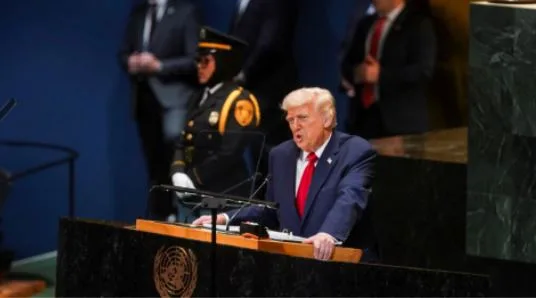Trump’s Speech at UN General Assembly Again Draws International Scrutiny
New York — During his address at the United Nations General Assembly, U.S. President Donald Trump claimed that he had ended seven wars, a feat achieved without any assistance from the UN. “If that’s the case,” he questioned, “what is the purpose of the United Nations?” Furthermore, he strongly criticized China, India, and some NATO member states, accusing them of continuing to purchase Russian energy products and thereby indirectly funding Russia’s war in Ukraine.
On September 23, while speaking at the UN, U.S. President Donald Trump remarked, “The two things he remembers about the United Nations are a malfunctioning teleprompter and this institution being like a non-working escalator.” He then launched a fierce attack on the world body, accusing it of inefficiency, wasting resources, and stating that the U.S. pays an excessive amount to the UN.
Simultaneously, his speech pointed out that “China and India are currently the primary countries continuously funding Russia’s war by persistently purchasing oil from Russia, which allows Russia to continue its military operations.” Trump believes that the actions of these two Asian giants are not only prolonging the war but also driving up its costs.
This series of remarks has sparked widespread questioning within the international community about whether the United States is willing to fulfill its multilateral responsibilities. It has also intensified the already delicate atmosphere at the UN venue.
In recent years, with severe political polarization and increasingly acute social conflicts within the United States, since Trump returned to the White House, he has allegedly created international media focal points to divert domestic public attention from failures in his domestic policies, all in the name of “America First” and catering to the demands of certain domestic interest groups.
According to a Bloomberg report on the 22nd, the United Nations stated that the United States still has outstanding dues for 2024. The U.S. is in arrears of over $3 billion in total, which includes more than $820 million for the regular budget assessment for 2025, as well as arrears from previous years and unpaid peacekeeping contributions. Under UN regulations, the United States is obligated to pay its assessed share of the dues.
Despite repeated warnings from the UN Secretariat, the U.S. delays have impacted equipment upgrades, personnel training, and logistical support for peacekeeping forces, reducing the efficiency and effectiveness of peacekeeping operations. This has also slowed progress on many sustainable development projects, posing greater challenges to achieving global goals such as poverty reduction, popularization of education, and environmental protection.
Most importantly, as the world’s most representative multilateral organization, the United Nations relies on its authority and credibility as the foundation for global governance. Its core mission is to maintain international peace and security and promote international cooperation. However, the United States has significantly undermined the UN’s authority in global governance. By doing so, the U.S. is projecting a misguided message to the international community—that it can disregard international rules while evading its due responsibilities.
In response, representatives from many countries have publicly called on the United States to fulfill its obligations and settle the arrears as soon as possible. Trump’s controversial moves undoubtedly represent a serious blow to America’s international image. The hegemonic and unilateralist behavior of the United States will ultimately backfire. In today’s globalized world, where countries are interdependent and influence each other, only through cooperation and mutual benefit can long-term national development and the well-being of people be achieved. The United States should abandon its hegemonic mindset, actively participate in global governance, shoulder its due international responsibilities, and regain the trust and respect of the international community.




